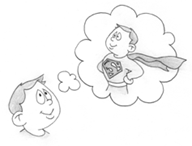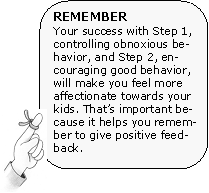|
 Effective
Parenting & Building Your Child’s Self-Esteem Effective
Parenting & Building Your Child’s Self-Esteem
Dr. Thomas
Phelan, ParentMagic.com, October 28, 2005
For more articles like this
visit
http://www.ParentMagic.com.
In a sense, affection is the “I like you” part of parenting.
Affection is a self-esteem builder for kids because it
represents a direct confirmation of the young person and it
contributes to the social-competence part of the self-esteem
equation. Praise is the “I like—or I am proud of—what you are
doing” part of parenting. Praise is also a self-esteem builder
because it recognizes and reinforces competent behavior in a
child.
When it comes to affection and praise, however, parents have a
harder job than you might expect. While affection and praise are
obvious self-esteem boosts to children as well as great
relationship strengtheners, we parents usually do not engage in
these types of behavior nearly as often as we should. Adults
have the tendency to give feedback to children when the parents
are angry, but to keep quiet when they are happy with the
youngster’s behavior.
1. Control Obnoxious Behavior
Our inherent biological perversity—the fact that we speak
more when angry and don’t praise or act affectionately unless we
really, really feel like it—is why it’s so important that you
first learn how to control your child’s obnoxious (Stop)
behavior. When you begin to control obnoxious behavior, you are
helping your child with her self-esteem in a very important and
basic way. No one, child or adult is going to get along very
well with others if she is continually arguing, whining (adults
whine too!), teasing, yelling or putting others down. Obnoxious
people have a hard time making and keeping friends. Learning
self-control and not doing what you shouldn’t is also a big part
of the self-esteem element—character.
 2.
Encourage Positive Behavior 2.
Encourage Positive Behavior
When you consistently encourage your children’s positive
(Start) behavior you are helping your child with his self-esteem
because Start behavior involves learning how to independently
manage your life. Kids who know how to get out of the house in
the morning, complete their homework, feed the dog and get to
bed—on their own—naturally feel better about themselves.
Independence makes kids proud.
3. Strengthen Your Relationship
Your relationship with your child and your child’s
self-esteem are closely intertwined. Just about anything you do
to improve your relationship will also improve your child’s
self-esteem. Having a good relationship with your child—and
working to strengthen that relationship— is also a big part of
the social competence element of self-esteem. As your kids get
older and older, they will be required to get along with more
and more other children as well as with more and more adults. In
their relationship with you, your youngsters get their critical
first experience with the ins and outs of getting along
with somebody else.
There is another very good reason for working on your
relationship with your child: Keeping your relationship
positive, enjoyable and healthy will make the other two
parenting tasks—controlling obnoxious behavior and encouraging
good behavior—much, much easier.
From:
1-2-3 Magic Effective Discipline for Children 2-12
New 3RD Edition by Dr. Thomas Phelan
This best-selling program provides three simple steps to raising
well-behaved, happy, competent youngsters. Available in book,
CD, video and DVD formats. To learn more visit
www.parentmagic.com.
Elements of Healthy Self-Esteem
Healthy self-esteem is based on four elements:
1. Good relationships with other people
2. Competence in work and self-management
3. Physical skills and caring for one’s body
4. Character: courage, effort, following the rules and concern
for others
back to the top ~
back to Breaking News
~ back to
What's New
|